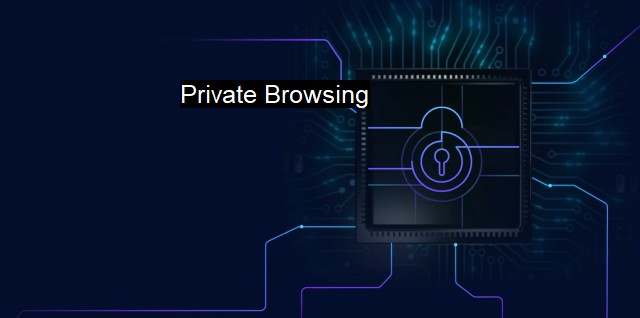What is Private Browsing?
Protecting Your Online Privacy: The Importance of Private Browsing and Antivirus Software to Keep Your Personal Information Safe
Private browsing, also known as incognito mode in some browsers, is a feature that provides an enormous layer of confidentiality across the internet. In the area of cybersecurity and antivirus, it is a highly significant aspect to understand.To break it down: When you browse the internet in normal mode, your browser stores a lot of information about your activities. This includes your browsing history, search history, autofill information, cookies, and temporary files. if you visit a website to buy a book, your browser may store your user details and password (if you ask it to remember them), the details of the book you viewed, and even the device you've used to visit the website. All of these pose potential risks in terms of cybersecurity.
Private browsing offers a different browsing experience. It effectively wipes your tracks clean after every browsing session. It doesn’t store the websites you visit, the forms you fill out, the data you enter into your browser, and it also doesn’t establish any searchable records of your browsing behavior that others can trace. Savvy users may therefore use private browsing as a valuable tool to keep their online endeavor confidential and safe.
It's important to clarify what private browsing does not do. Mistakenly, many users believe that private browsing completely anonymizes their internet behavior, leading them to assume they are not traceable or visible to hackers, advertisers, or potential attackers, which is not the case. While private browsing does stop information storage to your own computer, it does not stop your activities from being visible to others, particularly on the network you are using. if you’re accessing a network at a public place or at work, the system’s network administrator will still be able to track your activities.
Private browsing will not stop websites from collecting information about you through techniques often used by marketers, like cookies. Interestingly, some cookies are still used during private browsing, but they are deleted once the browsing window is closed. This means that areas like targeted advertising, which is chiefly influenced by your browsing history and the cookies on your device, won’t be as specific as it would be if you were browsing in normal mode.
Antivirus programs also interact with private browsing in unique ways. Some modern antivirus solutions offer improved safety features when you are browsing privately. They use advanced algorithms and large databases to identify harmful websites and stop you from visiting them in the first place. Yet, again, it must be stressed that even with an antivirus installed, private browsing doesn't necessarily shield you fully from digital threats such as viruses, malware, or phishing attacks.
While private browsing is a powerful tool for maintaining your privacy online, it is not foolproof. It does not offer complete invisibility online and it isn’t an ironclad safeguard against potential cyber threats. Therefore, it’s important to rely on other cybersecurity measures as well such as using a reliable antivirus software, employing a virtual private network (VPN), regularly updating your software and operating system, and exercising generally safe browsing habits. Regular education about noted cybersecurity threats and recent scams can also help to navigate the internet comfortably and confidently without obscuring threats from the equation.

Private Browsing FAQs
What is private browsing?
Private browsing is a feature in web browsers that allows users to browse the internet without saving any data locally, such as browsing history, cookies, or cache. This feature provides an added layer of privacy and security for users who wish to keep their online activities hidden.Is private browsing secure?
Private browsing is secure to the extent that it protects your privacy from other users who may have access to your device. However, it does not provide complete protection against cyber threats such as malware or phishing attacks. You should always use an antivirus program and exercise caution when browsing the internet.Can private browsing prevent hackers from accessing my data?
Private browsing alone cannot prevent hackers from accessing your data. They can still intercept your internet traffic and steal your sensitive information. Using a strong antivirus program and avoiding unsecured websites can help protect your data from cyber threats.How do I enable private browsing in my web browser?
The method of enabling private browsing varies depending on the web browser you are using. In general, you can find a private browsing option in the browser settings or by using a keyboard shortcut. For example, in Google Chrome, you can press Ctrl + Shift + N to open a new incognito window. It is important to note that private browsing may not be available in older versions of some web browsers.| | A | | | B | | | C | | | D | | | E | | | F | | | G | | | H | | | I | | | J | | | K | | | L | | | M | |
| | N | | | O | | | P | | | Q | | | R | | | S | | | T | | | U | | | V | | | W | | | X | | | Y | | | Z | |
| | 1 | | | 2 | | | 3 | | | 4 | | | 7 | | | 8 | | |||||||